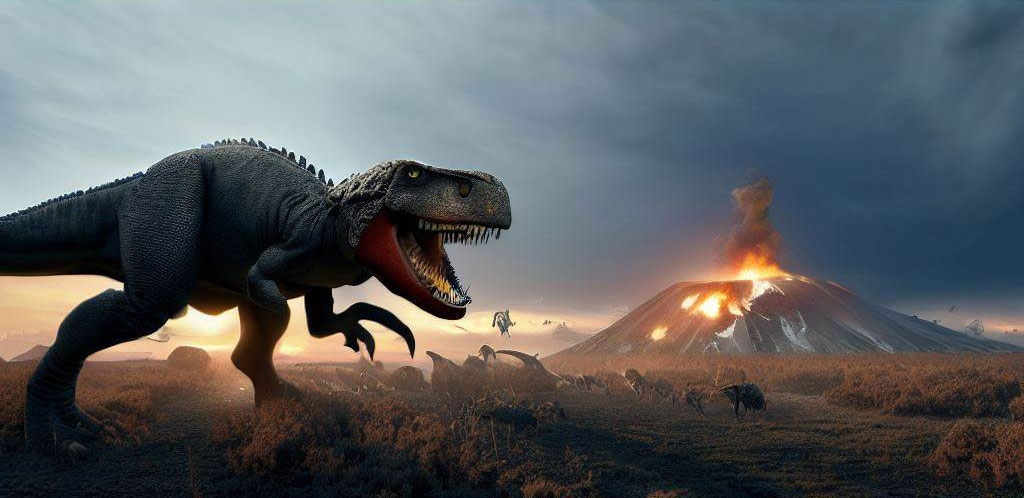- Dinosaurs
- Toys & Games
- Books
- Christmas
- Home / Garden
- Clothing
- Birthdays

Nobody knows for sure why the dinosaurs went extinct but there are a couple of theories which carry a lot of weight. Many people believe a mighty asteroid collided with the Earth wiping out the dinosaurs and others believe they died out due to ongoing climate change over a long period of time.
The Impact Event Hypothesis proposes that a massive asteroid or comet collided with the Earth, triggering a cataclysmic event that led to the extinction of dinosaurs. This theory gained significant attention following the discovery of the Chicxulub crater off the coast of Mexico's Yucatan Peninsula.
In the early 1980s, scientists uncovered a massive impact crater buried beneath layers of sediment. The Chicxulub crater, measuring approximately 180 kilometres in diameter, became a crucial piece of evidence supporting the Impact Event Hypothesis.
According to the Impact Event Hypothesis, the collision of the asteroid or comet caused an enormous explosion, releasing an immense amount of energy. This event triggered a chain reaction, leading to wildfires, tsunamis, earthquakes, and a global dust cloud that obstructed sunlight for an extended period.
Scientists have found various pieces of evidence corroborating the Impact Event Hypothesis. Geological records from the time of the extinction indicate a layer of iridium, a rare element found abundantly in asteroids but scarce on Earth. The discovery of shocked quartz and microtektites further supports the hypothesis, suggesting the occurrence of an impact event.
While the Impact Event Hypothesis provides a compelling explanation, some scientists argue that climate change played a significant role in the extinction of dinosaurs. Several climate change theories have emerged.
One prominent climate change theory involves massive volcanic eruptions, such as the Deccan Traps in India. These eruptions released enormous amounts of greenhouse gases and aerosols, causing significant shifts in the Earth's climate. The resulting environmental changes, including increased temperatures and reduced sunlight, may have led to the decline of dinosaur populations.
Another climate change theory proposes that long-term climate shifts played a crucial role in dinosaur extinction. Earth's climate undergoes natural variations over thousands of years, and dinosaurs, adapted to specific climatic conditions, might have struggled to cope with gradual changes in their habitats.
Scientists have gathered evidence to support climate change theories. Fossil records show shifts in plant and animal distributions, indicating changes in climate and ecosystems. Additionally, stable isotope analysis of dinosaur fossils has provided insights into ancient climatic conditions and changes that may have affected their survival.
While the Impact Event Hypothesis and Climate Change Theories dominate the discussion, some scientists propose a combination theory. This theory suggests that a combination of catastrophic events, including both an impact event and climate change, contributed to the extinction of dinosaurs. The debate continues as researchers strive to uncover more evidence and refine our understanding of this complex phenomenon.
In conclusion, the extinction of dinosaurs remains a captivating topic that has spurred various theories. The Impact Event Hypothesis highlights the significance of an asteroid or comet collision, while Climate Change Theories emphasize the role of long-term environmental shifts. The debate between these theories and the search for additional evidence continues to enhance our understanding of this momentous event in Earth's history.
A1: Yes, there are alternative theories proposed by scientists, including sea level changes, disease outbreaks, and even the influence of alien life forms. However, these theories lack substantial evidence and are not widely accepted in the scientific community.
A2: The extinction of dinosaurs occurred over a relatively short time span, estimated to be around a few thousand years. This rapid decline is evident in the fossil record.
A3: While non-avian dinosaurs perished, some avian dinosaurs (birds) managed to survive and thrive. Birds are considered direct descendants of the dinosaur lineage.
A4: Scientists utilize various methods, including geological studies, fossil analysis, chemical analysis of rocks and sediments, and computer simulations, to reconstruct and understand the events surrounding dinosaur extinction.
A5: The extinction of dinosaurs resulted in significant ecological changes. It opened up new ecological niches, allowing mammals to diversify and eventually dominate many habitats, leading to the rise of mammals as